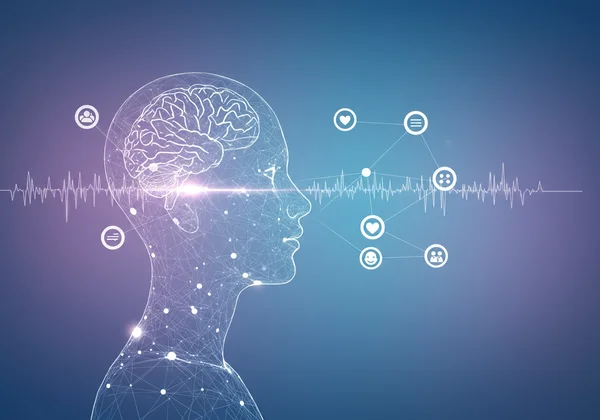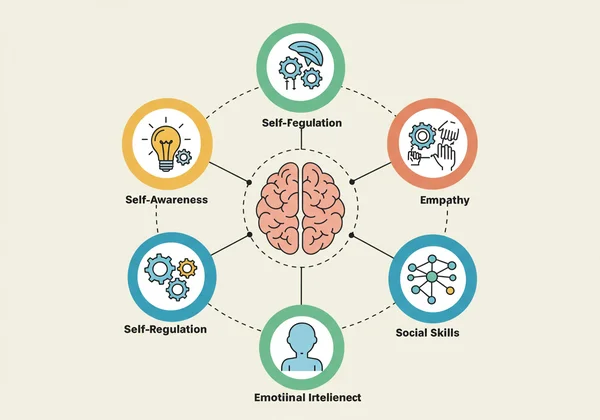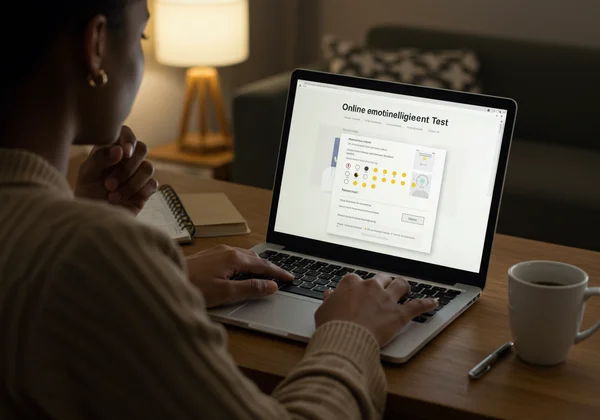How to Test Emotional Intelligence: Your Self-Assessment Guide
September 7, 2025 | By Phoebe Chandler
Ever felt a disconnect between what you think and how you act in stressful situations? Have you wondered why some people navigate social complexities with ease while others struggle? The answer often lies in emotional intelligence (EQ). This guide is here to demystify how to test emotional intelligence and walk you through a simple, empowering process of self-discovery. Are you ready to answer the question, "am i emotionally intelligent test?" and unlock your true potential? This journey begins with a single step: a self-assessment designed to illuminate your inner world.
Understanding your emotional landscape is one of the most powerful investments you can make in your personal and professional growth. It's not about being "emotional" but about being emotionally smart. By the end of this guide, you will understand the process, the benefits, and exactly how to get started on your own journey. You can even take a free EQ test to begin right away.

What is an Emotional Intelligence Test and Why Take One?
An emotional intelligence test, or EQ test, is a self-assessment tool designed to measure your ability to perceive, understand, and manage your own emotions, as well as those of others. Unlike an IQ test that measures cognitive ability, an EQ test focuses on the skills that govern our interactions and self-management. Think of it as a friendly mirror reflecting how you handle pressure, empathize with colleagues, and navigate your relationships.
Taking an emotional intelligence assessment is the first step toward meaningful self-improvement. It provides a baseline—a snapshot of your current emotional skills. This isn't about getting a "good" or "bad" score; it's about gaining awareness. This awareness empowers you to identify your strengths, pinpoint areas for development, and create a targeted plan for growth that can profoundly impact your career and personal life.
Understanding the Core Components of Emotional Intelligence
To appreciate what an EQ test measures, it's helpful to understand its key pillars. Inspired by the groundbreaking work of psychologists like Daniel Goleman, emotional intelligence is generally broken down into five core components. A quality emotional quotient test will touch upon these areas:
-
Self-Awareness: The ability to recognize and understand your own moods, emotions, and drives, as well as their effect on others. This is the foundation of EQ.
-
Self-Regulation: The skill of controlling or redirecting disruptive impulses and moods. It's about thinking before acting and managing your emotional state.
-
Motivation: A passion for work for reasons that go beyond money or status. It reflects a drive to pursue goals with energy and persistence.
-
Empathy: The ability to understand the emotional makeup of other people. It's the skill of treating people according to their emotional reactions.
-
Social Skills: Proficiency in managing relationships and building networks. It’s about finding common ground and building rapport.

The Personal and Professional Benefits of Knowing Your EQ
Knowing your EQ score is more than just an interesting piece of trivia; it’s a catalyst for real-world change. For the self-improver, understanding your emotional intelligence can lead to better stress management, improved relationships, and a greater sense of well-being. Imagine navigating difficult conversations with confidence or bouncing back from setbacks with resilience. These are the tangible results of high EQ.
For professionals and leaders, the benefits are even more pronounced. High emotional intelligence is a hallmark of effective leadership. It fosters better team collaboration, improves communication, and drives employee engagement. A leader who understands their team's emotional landscape is better equipped to motivate, inspire, and guide them toward success. Knowing your team's EQ can transform workplace performance.
Your Step-by-Step Guide to Taking an Online EQ Assessment
Embarking on your EQ test process is straightforward and insightful. The journey is designed to be reflective, not stressful. By following these simple steps, you can ensure you get the most accurate and helpful results from your self-assessment. The goal is to gain clarity, not to achieve a perfect score.
The entire process, from starting the test to receiving your initial report, is designed to be quick and accessible. You can start your assessment in just a few minutes and get immediate insights into your emotional profile.
Choosing a Reliable Emotional Intelligence Test Online
The internet is filled with quizzes, but for meaningful results, it’s crucial to choose a reliable test. Look for an online emotional intelligence test that is inspired by established psychological frameworks (like those developed by Salovey, Mayer, or Goleman). A trustworthy test will be transparent about its purpose, assuring you that it's a tool for self-development, not a clinical diagnosis.
Our platform provides a comprehensive and accessible free emotional intelligence test designed for this very purpose. It offers a free basic report and an optional AI-powered deep dive for those seeking highly personalized, actionable insights.
Navigating the Test Questions: Tips for Accurate Self-Reflection
To get the most out of your EQ assessment, your honesty is key. There are no right or wrong answers, only your answers. Here are a few tips for achieving genuine self-reflection during the test:
-
Be Spontaneous: Go with your first instinct. Overthinking can lead you to answer based on who you want to be, not who you are right now.
-
Be Honest: Remember, this is for you. Answer truthfully about how you typically behave in various situations, not just on your best days.
-
Find a Quiet Space: Take the test in a calm environment where you can focus without distractions. This will help you connect with your true feelings.

What to Expect After Completing Your Emotional Intelligence Test
Once you complete the questions, you'll receive your results. A good test won’t just give you a number; it will provide context. On our platform, you immediately receive a foundational EQ score and a brief interpretation for free. This gives you an instant overview of your emotional intelligence profile.
For those who want to go deeper, there's an option to unlock a more detailed report. This advanced analysis offers personalized insights into your specific strengths and challenges, along with concrete suggestions for improvement. This is where the real work of personal growth begins.
Beyond the Score: Turning EQ Insights into Action
Receiving your EQ score is the beginning of your journey, not the end. The true value of any assessment lies in what you do with the information. An emotional intelligence test is a map; it's up to you to take the steps toward your destination of improved self-awareness and stronger emotional skills.
The goal is to transform insight into practical, everyday habits. Is there a test for emotional intelligence that helps with this? Yes, a good one provides a clear path forward. It moves you from "what" to "so what" and finally to "now what."
Interpreting Your Personalized Emotional Intelligence Report
Your report is your guide. It will likely break down your overall score into the core components mentioned earlier. Pay close attention to both your high and low-scoring areas. Your strengths are tools you can lean on, while your areas for development are opportunities for growth.
An AI-driven personalized report, like the one offered on our site, provides an even richer understanding. It connects your answers to specific behavioral patterns and offers tailored advice. This level of detail makes it easier to see how your EQ impacts your daily life and what specific actions will yield the biggest improvements.
Practical Strategies to Cultivate Your Emotional Skills
Once you know where to focus, you can start building your emotional skills. Here are a few practical strategies to get you started:
- To Improve Self-Awareness: Keep a journal for a week. Note down situations that triggered strong emotional responses and reflect on why.
- To Enhance Self-Regulation: When you feel overwhelmed, practice the "pause." Take a deep breath before responding to a stressful email or conversation.
- To Develop Empathy: Actively listen in your next conversation. Try to understand the other person's perspective without judgment or interruption.
These small, consistent actions are the building blocks of higher emotional intelligence. You can always discover your EQ again later to track your progress.

Ready to Unlock Your Emotional Potential?
You now know how to test emotional intelligence and why it's a critical step toward personal and professional mastery. This journey of self-assessment is not about judgment; it's about empowerment. By understanding your emotional makeup, you gain the power to manage your reactions, improve your relationships, and lead a more fulfilling life.
Your path to higher EQ starts with a single, simple action. Don't wait to unlock the insights that can transform how you see yourself and the world around you.
Take the next step on your self-discovery journey. Begin your test now and receive your free emotional intelligence report in minutes.
Frequently Asked Questions About Emotional Intelligence Testing
What Exactly Does an Emotional Intelligence Test Measure?
An emotional intelligence test measures a set of skills related to emotional perception and management. It typically assesses the five core components: self-awareness, self-regulation, motivation, empathy, and social skills. It provides a snapshot of your ability to navigate emotional landscapes effectively.
How Long Does an Online EQ Self-Assessment Typically Take?
Most online EQ self-assessments are designed to be quick and convenient. For instance, the test on our platform consists of 20 questions and usually takes only 5-10 minutes to complete. This allows you to get valuable insights without a significant time commitment.
What is Considered a "Good" Score on an Emotional Intelligence Test?
There is no universal "good" or "bad" score. The score is a baseline for your personal growth. The focus should be less on the number itself and more on understanding what it says about your strengths and areas for improvement. Any score is a great starting point for development.
Is an Online Emotional Intelligence Test Scientifically Valid?
The validity of an online test depends on its design. Reputable tests, like ours, are inspired by established psychological theories and frameworks, such as the work on TEIQue and MSCEIT concepts. While they are intended for educational and self-development purposes and are not clinical diagnostic tools, they provide reliable and practical insights.
How Can I Improve My EQ After Taking the Test?
Improving your EQ involves conscious effort and practice. Start by focusing on the development areas highlighted in your report. Practice mindfulness to increase self-awareness, active listening to build empathy, and reflective journaling to improve self-regulation. The best way to start is to first understand your baseline by taking an emotional intelligence appraisal test.